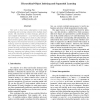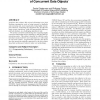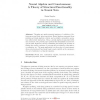1863 search results - page 52 / 373 » Unifying Theories of Objects |
FSKD
2005
Springer
14 years 2 months ago
2005
Springer
It is important nowadays to provide guidance for individuals or organizations to improve their knowledge according to their objectives, especially in the case of incomplete cogniti...
ICPR
2004
IEEE
14 years 10 months ago
2004
IEEE
This work is about scene interpretation in the sense of detecting and localizing instances from multiple object classes. We concentrate on object indexing: generate an over-comple...
CF
2010
ACM
13 years 7 months ago
2010
ACM
Lock-free data objects offer several advantages over their blocking counterparts, such as being immune to deadlocks and convoying and, more importantly, being highly concurrent. H...
CORR
2011
Springer
13 years 4 months ago
2011
Springer
: - The Distributed object computing is a paradigm that allows objects to be distributed across a heterogeneous network, and allows each of the components to interoperate as a unif...
AB
2008
Springer
14 years 3 months ago
2008
Springer
Abstract. Thoughts are spatio-temporal patterns of coalitions of firing neurons and their interconnections. Neural algebras represent these patterns as formal algebraic objects, a...



